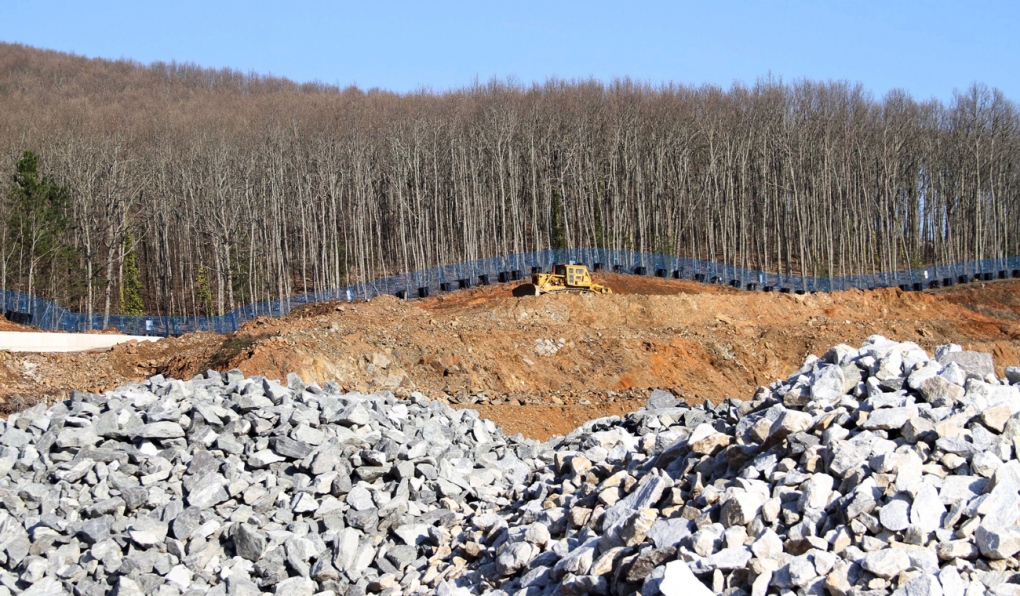Mining company says Timmins could supplant Sudbury as global nickel capital
 Deposits being explored in the Timmins area could become major source of high-quality nickel for the electric car battery market. (File)
Deposits being explored in the Timmins area could become major source of high-quality nickel for the electric car battery market. (File)
Deposits being explored in the Timmins area could become major source of high-quality nickel for the electric car battery market.
That's the word from officials with Canada Nickel, which is working on developing its Crawford deposit. It's also excited about another find, the Reid Property, located 16 kilometres southwest of Crawford, or 37 kilometres northwest of Timmins.
Mark Selby, Canada Nickel CEO and director, told a news conference this week that deposits in the area have the potential to become one of the largest sources of nickel for EV batteries in the world.
"We're really talking about building one of the world's largest nickel sulfide districts, you know, potentially larger than Sudbury," Selby said Tuesday.
"(We're) in a point in time where the market is desperate for large-scale, scalable low-carbon sources of nickel to be able to have a nickel for the electric vehicles that everybody would like to produce over the next few months."
That's important as demand for electric cars – and nickel – increases, putting the squeeze on supply. He said nickel production at Vale in Ontario and Manitoba has plummeted in the last 15 years as viable ore deposits become harder to find.
"Production at Inco Sudbury, has, you know, fallen dramatically since the Vale took it over in 2007," Selby said.
"Production at Thompson (Manitoba mine) is 75 per cent lower than where it was in 2007."
While production globally is stagnant, he said demand is about to sharply increase.
"Nickel is about to go through one of its supercycles, as we get this large new source of demand from the electric vehicle market," he said.
The deposits contain low-carbon nickel that customers are demanding, as opposed to nickel from China or Indonesia. And with agreements in place with First Nations in the area, they are well-positioned to supply the EV market.
"The auto industry is not going to depend on Chinese-controlled supply," Selby said.
"Given the fact that the adoption rate of electric vehicles is well ahead of what most people had expectations-wise just a few years ago, we really do need to double (global nickel) supply."
And the tailings from the extracted nickel actually absorbs carbon, he said. Within a year, he said it forms into a substance that absorbs carbon.
"That rock reaches out to the atmosphere, grabs a CO2 molecule and permanently sequesters that carbon in a mineral called magnesite," Selby said.
"We think this is a very, very big breakthrough in terms of being able to capture carbon globally."
Longer-term, he expects Canada Nickel will attract interest from major mining companies, making the comparison with Noront Resources, recently bought by Wyloo Metals.
"We had a massive bidding war for Noront earlier this year," Selby said.
"We're obviously one of those new deposits that are out there and we expect to get some pretty significant interest from the majors as we move forward."
See Selby's full presentation here.
CTVNews.ca Top Stories

London Liberal MPs say that Trudeau is taking time to reflect on the future of the party
Both of London’s Liberal MPs are choosing their words carefully when it comes to their party's leadership future. They were asked about the situation in Ottawa at Friday's housing announcement in London.
New rules clarify when travellers are compensated for flight disruptions
The federal government is proposing new rules surrounding airlines' obligations to travellers whose flights are disrupted, even when delays or cancellations are caused by an "exceptional circumstance" outside of carriers' control.
Trudeau's 2024: Did the PM become less popular this year?
Justin Trudeau’s numbers have been relatively steady this calendar year, but they've also been at their worst, according to tracking data from CTV News pollster Nik Nanos.
Wild boar hybrid identified near Fort Macleod, Alta.
Acting on information, an investigation by the Municipal District of Willow Creek's Agricultural Services Board (ASB) found a small population of wild boar hybrids being farmed near Fort Macleod.
Manhunt underway after woman, 23, allegedly kidnapped, found alive in river
A woman in her 20s who was possibly abducted by her ex is in hospital after the car she was in plunged into the Richelieu River.
Calling all bloodhounds: These P.E.I. blood donors have four legs and a tail
Dogs are donating blood and saving the lives of canines at the University of Prince Edward Island's Atlantic Veterinary College in Charlottetown.
Summer McIntosh makes guest appearance in 'The Nutcracker'
Summer McIntosh made a splash during her guest appearance in The National Ballet of Canada’s production of 'The Nutcracker.'
A 9-year-old is among 5 killed in the Christmas market attack in Germany
A nine-year-old was among five people killed when a Saudi doctor intentionally drove into a Christmas market teeming with holiday shoppers in the German city of Magdeburg, an official said Saturday.
Toronto firefighters rescue man who fell into sinkhole in Yorkville
A man who fell into a sinkhole in Yorkville on a snowy Friday night in Toronto has been rescued after being stuck in the ground for roughly half an hour.

































